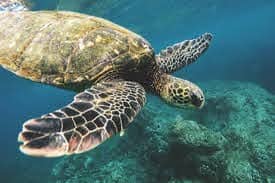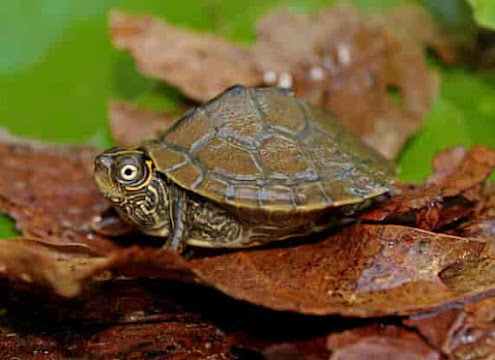What Do Turtles Eat

Turtles are aquatic
animals. Sea turtles live in salt water of the oceans and seas and the fresh
water turtles live in fresh water of ponds, lakes etc. The turtle’s food habit
is depended on their species, the structure of their jaws, their habitats and the
food sources availability.
Turtles are
omnivores but hawksbill turtles prefer to eat sea sponges and
leatherbacks prefer jellyfish. As turtles are omnivore, turtles eat aquatic
animals and vegetation as well as fruits, vegetables, leaves, grass, worms,
insects, small land animals like mice, frog, snails etc.
What Do Sea Turtles Eat?

There are seven different species of sea turtles are
found from the Indian Ocean to the colourful reefs of the Coral Triangle and
also the sandy beaches of Eastern Pacific. The seven species are:-
·
Loggerhead turtle
·
Green turtle
·
Hawksbill turtle
·
Leatherbacks turtle
·
Flatback turtle
·
Kemp’s ridley turtle
· Olive ridley turtle
1. Loggerhead Turtle
Loggerhead Turtles are mainly carnivores. They have strong jaws that help them to crush the conches, bivalves, horseshoe crabs and other hard-shelled preys, which are their favourite food items. They also catch jellyfish, shrimps, fish, sponges etc. to eat. Although, sometimes the loggerhead turtles eat seaweed and sargassum.
2. Green Turtle
Green turtle is omnivores but adults eat only plants so they can be called herbivores. The adult turtles eat sea grasses, seaweed, algae. Green turtles have serrated beaks that help them to tear grasses and seaweeds and also scrape algae off rocks. Juvenile green turtles eat invertebrates like crabs, sponges, and jellyfish.
3. Hawksbill Turtle

Hawksbill turtles like to eat sea sponges but they are omnivores. Hawksbill turtles are found near coral reefs because their favourite food sea sponges are found there. Sea sponges which make the turtle’s 70% to 95% of diet. However, they do not eat all species of sea sponges, they prefer to eat only selected species such as as Aaptos aaptos, Chondrilla nucula, Tethya actinia, Spheciospongia vesparium which is commonly known as loggerhead sponge and Suberites domuncula.
As they are omnivores, Hawksbill turtle eat small fish, jellyfish, marine algae, mollusks, sea urchins crustaceans. Their unique beak-like mouths and sharp beaks help them to reach into small holes and cracks in coral reefs to find their food. Their beaks help them to crush, bite and tear the food. In a year, Hawksbill turtles eat an average of 1200 pounds of sponges. Some of the sponges and sea animals which are eaten by Hawksbill turtle are toxic but the body fat of the turtle absorbs the toxins without making them ill but meat of the turtle is poisonous to humans.
4. Leatherback Turtle

The leatherback turtle is the most unique turtle. They have no body shell. Their carapace has a smooth, leathery skin that covers a flexible matrix of bone. Leatherback turtle eat mainly jellyfish or gelatinous prey so they are also referred to as gelatinivores. This turtle eats invertebrates from the water such as sea squirts and tunicates as well as fish, crustaceans, seaweeds. They have sharp, backward pointing spines, one on the upper jaw and one on the lower, jaw that help them to pierce, swallow the jellyfish and prevent the prey from escaping from their mouth.
Leatherback turtles prefer to eat jellyfish. When they see plastic bags floating on the water, they are attracted to them, resemble jellyfish and eat plastic bags that often kill them.
5. Flatback Turtle
Flatback turtle is omnivores and can eat sea cucumber, mollusks, bryozoans, jellyfish, prawns and other invertebrates. Flatback turtles also eat seaweeds, soft corals, sea pens and sea grasses.
6. Kemp’s ridley Turtle
Kemp’s ridley turtle is omnivore. The turtles eat fish, shrimps, jellyfish, crabs, molluscs, squids, shellfish and also eat seaweed and sargassum. Their favourite food is crabs.
7. Olive ridley Turtle
Olive ridley turtle is carnivore but occasionally the turtles
eat algae, seaweeds and other marine vegetation. The Olive ridley turtles
also eat fish, jellyfish, crabs, snails, shrimps, urchins, lobster etc.
What Do Freshwater Turtles Eat?
Freshwater turtles live in freshwater of ponds, lakes,
rivers. The freshwater turtles eat aquatic plants, worms, invertebrate, insects, larva, algae,
snails, fruits, vegetables, seeds etc. Some species of freshwater turtles
eat frog, beetles, cricket, flowers, stems of the plants, snail, fish,
small mammals, eggs also. Some terrestrial turtles also eat carrion.
What Do Pet Turtles Eat?
There are many turtle species in the world but all of them not make good pets, some species make better pets than others. Different people have different expectations; some people want a long living turtle and others like active and friendly turtle species. Here are the top ten pet turtles and their food habits-
· Red-Eared Slider

Red eared slider is a popular turtle species. They are omnivores. The turtles eat flesh of animals as well as other vegetation or plant materials. They eat leafy green vegetables, fruits, small fish, krill, shrimps, any insects like cricket, earthworm, wax worms, snails, daphnia, mealworms and sometimes dead aquatic animals. In captivity, the Red eared slider turtles eat commercial turtle food or pellets, fruits vegetables fish, carrot, green beans, squash, leafy vegetables etc.
Red eared slider turtle like to eat aquatic vegetation such as anacharis, water lettuce, azolla or fairy moss, duckweed etc.
· Eastern Box Turtle
Eastern box turtle is omnivore so they eat plants as
well as animals. Eastern box turtles eat almost everything like berries,
roots, flowers, grass, leaves, vegetables, eggs, frogs, snails, snakes, insects
etc. They are land turtle and can live 40 years.
The leaves of rhubarb, potato, tobacco and tomato leaves and vines, avocado peel, seeds or leaves are poisonous to Box turtle. Chocolates and dairy products like milk, cheese, and yogurt are bad for Box turtle.
· Painted Turtle
Painted turtle is omnivore. Painted turtles eat
small fish, earthworm, snail, krill, shrimp, mealworms, parsley, lettuce,
dandelion, red leaf lettuce, berries, apples, duckweed. They can eat meat and
dog food also.
The Western painted turtle’s diet changes seasonally.
In early summer, 60% of their diet includes insects but in late summer 55% is
plants. The Western painted turtles eat white water-lily seeds and disperse the
seeds through their faces.
This gorgeous turtle can live 30 to 55 years and can grow 6 to 8 inches so they are easy to manage.
· Mississippi Map Turtle

Mississippi map turtle is also referred as the “sawback” turtle. They have yellow stripes which run along their bodies. Mississippi map turtles are omnivores. The turtles eat leafy greens, spinach, lettuce, parsley, fruits,dandelion greens as well as cricket, mealworms, shrimps, fish, frog, snail, earthworm, commercial turtle pellets etc. In fact, they eat everything and only feed when they are in water. They are omnivores but the adults are carnivores and eat 4 or 5 times a week but young turtles eat once daily. Mississippi map turtle can live 33 years.
· African Sideneck Turtle
African sideneck turtle is omnivore so they eat both plants
and animals. African sideneck turtles eat insects, fish, collard greens,
leafy green vegetables mollusks, earthworm, leeches, crabs, frogs, shrimps,
prawns, cricket, snails, earthworms, fruits, seeds, crustaceans and aquatic
turtle pellets which include the calcium and vitamins and minerals. Meat is bad
for the turtle.
African sideneck turtle is a popular pet because of its cute smiling face and unique appearance. They are active all year round and easy to care. They can live around 24 years to 50 years.
· Musk Turtle (Stinkpot)

Musk turtle or stinkpot is a carnivore. The turtles
eat variety of aquatic invertebrates such as snails, aquatic larva,
crayfish, small fish, tadpole etc. But sometimes they eat algae and enjoy
grazing on leafy greens. In captivity, they eat commercial turtle pellets.
Musk turtle or stinkpot can grow 3 to 5 inches and can live up to 50 years. Musk turtle or stinkpot turtles are popular pet because of their size and ease of care.
· Spotted Turtle
The spotted turtle is a small-sized turtle species.
They are omnivores. The spotted turtles eat shrimps, worms, cricket,
spider, larva, slugs, salamanders, tadpole, millipedes, fruits, leafy
vegetables, duckweeds etc. They feed only when they are in water. In captivity,
the turtle eat commercial turtle pellets, canned fish and fruits like
water melon cantaloupe.
The spotted turtles can grow 4 to 6 inches and they can live up to 50 years. As they are small in size and look pretty for their distinctive spotted shell, so they become popular pet.
· Yellow-Bellied
Slider
Yellow-Bellied slider is omnivore. They are water and
land turtle. The turtles eat fish, tadpole, spiders, snails, bugs, crayfish,
larva, dragonfly etc. They also eat seeds, roots, leaves, algae, foliage,
stems, vegetables, fruits. Occasionally they are seen to eat dead carcasses of
other animals. In captivity, Yellow-Bellied slider turtles eat vegetables,
fruits, meat, sea-food, wax worms mealworms, turtle pellets etc.
Yellow-Bellied slider can grow 9 to 13 inches and can live 30 to 40 years.
· Reeve’s Turtle
Reeve’s turtle is omnivore. The turtles eat
aquatic food, meat products, dried food. They like to eat brown crickets. Reeve’s
turtles eat cockroaches, shrimps, salmon, mice, chicken meat, locusts
etc.
Reeve’s turtle can grow 6 to 9 inches and can live up to 20 years. Reeve’s turtle is one of the most sociable turtle. Their charming personality makes them a popular pet.
· Wood Turtle

Wood turtle is omnivore. Wood turtles eat
plants and animals such as slugs, snails, tadpoles, eggs, mice earthworms, as
well as mushrooms, ripe fruits, specific fungi, moss, grass, and also consume
carrion. The turtle likes to eat strawberries, blackberries, mulberries,
raspberries, blueberries, banana, peach, melon, grapes. In captivity, wood turtles
eat dog or cat food, and also commercial turtle pellets.
Wood turtle can grow 5 to 8 inches and can live up to
50 years. Wood turtle is very friendly
species and one of the popular pet turtles.
All sea
turtles are considered threatened species of extinction. Leatherback sea turtles are among the highest
migratory animals on Earth. They travel about 10,000 miles each year in search
of jellyfish. Sea turtle nesting beaches are
affected by sea level rise due to global warming. Coral
reefs, a major source of food for sea turtles, are at high risk. Warm sea temperatures can have a negative effect on
the food resources of sea turtles.


.jpg)














0 Comentarios:
Post a Comment
Please do not use any abusing words or enter any spam links in the comment box